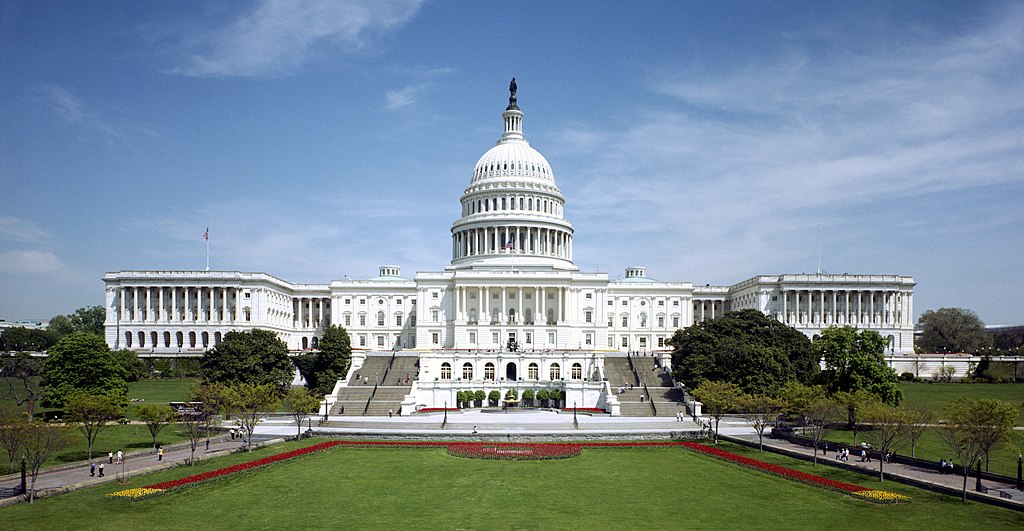What’s in the Omnibus Spending Bill?
Facing a looming Friday-night deadline to prevent a government shutdown, House and Senate negotiators released the text of a $1.3 trillion spending bill last night. Running 2,000-plus pages, the bill both allocates federal money through the end of September 2018 and contains a number of important, non-spending provisions. Here are some highlights that may be of particular interest to Lawfare readers.
What’s so important about this bill?

Facing a looming Friday-night deadline to prevent a government shutdown, House and Senate negotiators released the text of a $1.3 trillion spending bill last night. Running 2,000-plus pages, the bill both allocates federal money through the end of September 2018 and contains a number of important, non-spending provisions. Here are some highlights that may be of particular interest to Lawfare readers.
What’s so important about this bill?
In February, Congress reached an agreement to raise statutory budget caps for overall defense and non-defense discretionary spending for fiscal years 2018 and 2019. That deal specified how much money Congress had to spend, but not exactly how legislators would spend it. Determining exact funding levels for federal programs and delineating various restrictions on how that money could be spent was left for another day. That day came this week, in the form of the omnibus bill.
Beyond fulfilling one of Congress’s basic governing responsibilities—albeit more than five months past its statutory deadline for doing so—the omnibus is widely thought to be the last train leaving the station on Capitol Hill for the next several months. While Congress has struggled to meet deadlines in recent months—the difficulty extending section FISA Section 702 surveillance authority was a case in point—legislators often rely on their momentum to get across the finish line. With no major action-forcing mechanisms on Congress’s agenda for the next several months, this measure represents a particularly attractive vehicle for advancing non-spending policy goals. Expanding the universe of issues under consideration has pros and cons. On one hand, adding unrelated items to the spending bill makes it easier to create win-win situations for members. But on the other, attempts to attach too many items can jeopardize the overall effort.
What’s in the bill?
- Border Security
The bill contains roughly $1.6 billion for building or replacing barriers along the U.S.-Mexico border. Notably, the roughly $1.3 billion earmarked for construction can only be used for “operationally effective designs” that were in use for the purpose as of May 2017. Put differently, the funds can’t be used to build the kind of new wall prototypes that President Trump viewed on a recent trip to Southern California. Both parties will likely claim credit for the final shape of this provision—Republicans will point to the new spending, while Democrats will highlight the limits of its reach.
- Election Security
In preparation for the 2018 midterm elections, the bill includes $380 million for Election Assistance Commission grants to states “to improve the administration of elections for Federal office, including to enhance election technology and make election security improvements.” In addition, the measure also increases funding for the FBI, with some money to be used for “the counterintelligence and cyber-related investments necessary to help respond to foreign actors, including those seeking to compromise democratic institutions and processes.” The Department of Homeland Security title also specifies funding “to support the new Election Infrastructure Security Initiative (EISI).”
- Technology Modernization Fund
The bill provides $100 million—roughly $128 million less than was requested—for a new Technology Modernization Fund at the General Services Administration, to be used for IT upgrades meant, in part, to prevent government cybercrimes, terrorism, and intrusion. The Fund was authorized as part of the National Defense Authorization Act signed by President Trump in December 2017.
- Countering Russian Influence
The bill increases, to $250 million, the amount allocated to the Countering Russian Influence Fund.
- State Department Reorganization
As the State Department prepares to transition to new leadership, the bill explicitly requires congressional consultation before a redesign or reorganization is implemented.
- CLOUD Act
This legislation—which has been the subject of extensive discussion on Lawfare—would provide an updated regulatory framework for governments to request data held outside their borders during law enforcement investigations. The bill’s inclusion in the omnibus is particularly notable because lawmakers were facing a ticking clock: The CLOUD Act, if passed, would moot the upcoming Supreme Court decision on cross-border data access in United States v. Microsoft.
- Taylor Force Act
This bill would prohibit (with a few exceptions) additional U.S. financial assistance to the Palestinian Authority unless it halts payments to the family members of Palestinians who have been imprisoned or killed as the result of the conflict with Israel. As a standalone bill, the measure had bipartisan cosponsors in both chambers when they were introduced last year, and the House passed its version by voice vote in December.
What’s not in the bill?
- Language Protecting the Special Counsel
Earlier this week, several high-profile members, including House Minority Leader Nancy Pelosi (D.-Calif.) and Senate Minority Leader Chuck Schumer (D.-N.Y.) and Sen. Bob Corker (R.-Tenn.) called for language protecting Special Counsel Robert Mueller in the event he is terminated by President Trump. Two such bills were introduced independently in the Senate over the summer: One would provide for judicial review of any dismissal of the special counsel before a firing and one for such review afterward. But no such provision made it into the omnibus bill, and the House Rules Committee prevented an amendment that would have reduced Mueller’s salary to zero from being offered to the bill on the floor.





